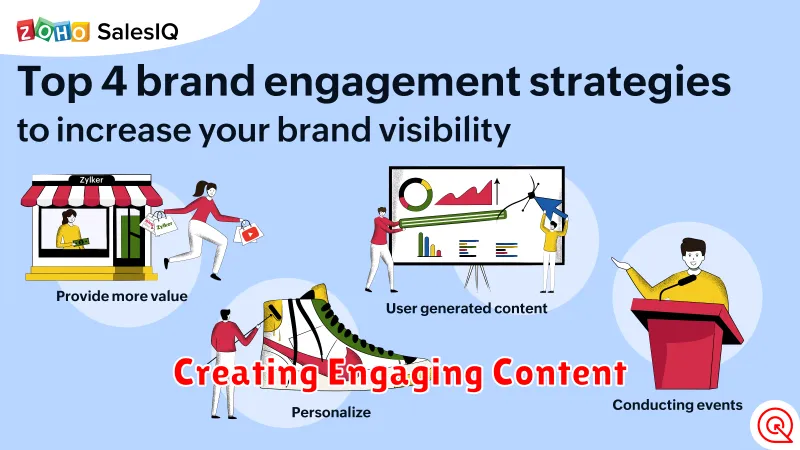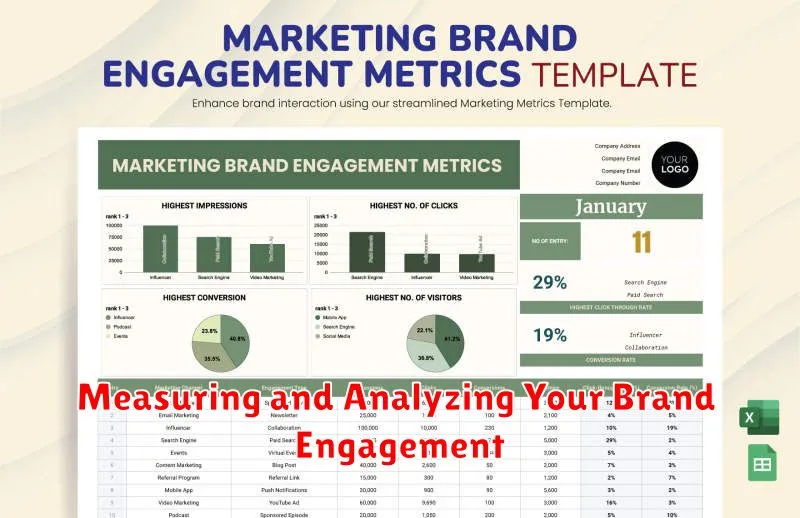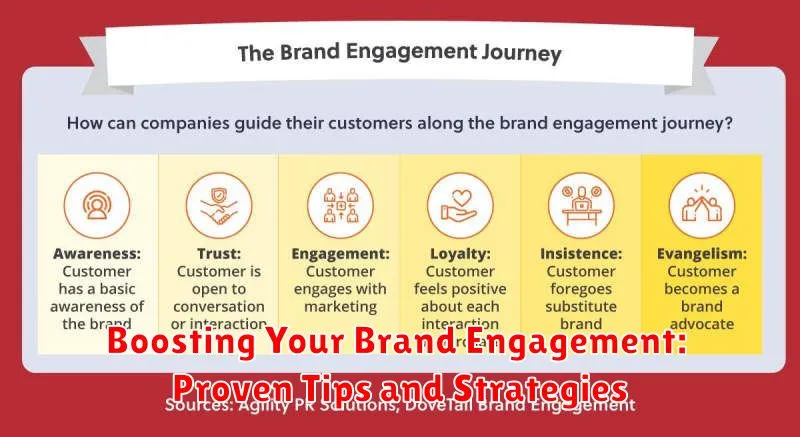In today’s competitive market, brand engagement is more critical than ever. It’s not enough to simply have customers; you need to cultivate a loyal following that actively interacts with your brand. This article will delve into proven tips and strategies to boost your brand engagement, ultimately strengthening your brand’s presence and driving business growth. We’ll explore actionable tactics that you can implement immediately to connect with your audience on a deeper level, fostering lasting relationships and transforming casual consumers into passionate brand advocates.
From understanding your target audience to leveraging the power of social media and content marketing, we’ll cover a range of effective techniques for maximizing your brand engagement efforts. Whether you’re a small startup or a large corporation, the insights provided here will empower you to create a vibrant community around your brand, generating buzz, driving sales, and achieving sustainable success. Discover how to effectively measure your brand engagement initiatives and adapt your strategies to ensure continued growth and a strong return on investment.
What is Brand Engagement?
Brand engagement encompasses all the interactions a customer has with your brand. It’s more than just a single purchase or a website visit. It refers to the depth and meaningfulness of these interactions, reflecting the emotional connection a customer has with your brand.
Engaged customers are more likely to interact with your content, share their experiences, and advocate for your brand. This encompasses actions such as liking, commenting, sharing, and reviewing your content online, participating in discussions about your brand, and providing feedback. Offline engagement can include attending brand events, contacting customer service, and even simply talking about the brand with friends and family.
It’s important to understand that brand engagement isn’t solely driven by your marketing efforts. While your campaigns play a role, it’s the overall customer experience that truly fuels engagement. This includes factors like product quality, customer service, and brand values.
Why is Brand Engagement Important?
Brand engagement is crucial for fostering stronger customer relationships and driving business growth. When customers actively engage with your brand, they move beyond simple awareness and develop a deeper connection. This connection translates into several key benefits.
Increased engagement often leads to higher customer loyalty. Customers who feel connected to a brand are more likely to become repeat purchasers and brand advocates, organically promoting your business to their networks. This organic growth can significantly reduce reliance on costly advertising.
Valuable customer insights are another benefit. Through engagement, brands can gather data about customer preferences, needs, and pain points. This information helps tailor products, services, and marketing strategies for better effectiveness and resonance with the target audience.
Finally, strong brand engagement contributes to a positive brand reputation. Active and satisfied customers create a buzz around your brand, generating positive word-of-mouth and social proof, which enhances credibility and attracts new customers. This positive perception can be a powerful differentiator in a competitive market.
Creating Engaging Content

Content is at the heart of any successful brand engagement strategy. Creating high-quality, relevant, and valuable content is crucial for capturing your audience’s attention and encouraging interaction.
Focus on understanding your target audience. What are their interests, needs, and pain points? Tailor your content to resonate with them specifically. Ask yourself what value your content provides to your audience. Does it educate, entertain, or inspire?
Diversify your content formats. Experiment with videos, infographics, blog posts, and interactive quizzes to keep your content fresh and engaging. Don’t be afraid to try new things and see what resonates best with your audience.
Storytelling is a powerful tool for connecting with your audience on an emotional level. Share compelling stories that showcase your brand’s values and personality. Authenticity is key. Be genuine and transparent in your communication.
Ensure your content is easily shareable across different social media platforms. This will amplify your reach and encourage organic engagement.
Building a Strong Community
A strong community fosters a sense of belonging and shared interest around your brand. It provides a platform for customers to interact with each other and your brand, strengthening their connection and loyalty.
Start by providing a dedicated space for your community. This could be a dedicated forum on your website, a Facebook group, or a Discord server. Encourage interaction within this space by posing questions, starting discussions, and responding to comments. Active participation is key to building a thriving community.
Highlight user-generated content to showcase customer appreciation and build connections. Feature customer testimonials, reviews, and creative content on your social media platforms and website. This not only validates your brand but also encourages others to engage.
Run community-exclusive events and activities. These could be online Q&A sessions, workshops, or even virtual meetups. This provides a sense of exclusivity and strengthens the bond within the community.
Running Effective Social Media Contests and Giveaways
Social media contests and giveaways are powerful tools for boosting brand engagement and generating excitement around your brand. Properly executed campaigns can significantly increase brand visibility, attract new followers, and drive valuable user-generated content.
Clearly define your objectives. Are you aiming to increase brand awareness, generate leads, or drive sales? Your goals will inform the type of contest you run and the prizes you offer. A contest focused on user-generated content could involve asking users to share photos or videos related to your brand.
Keep the rules simple and easy to understand. Complicated entry requirements can deter participation. Clearly outline how to enter, the duration of the contest, and eligibility criteria. Announce the winners promptly and transparently.
Choose prizes relevant to your target audience. The more desirable the prize, the higher the participation rate is likely to be. Consider offering products or services related to your brand or partnering with complementary businesses for prize packages.
Leveraging Influencer Marketing
Influencer marketing can significantly impact brand engagement. By partnering with relevant influencers, you can tap into their established audience and build credibility. Choosing the right influencer is crucial. Look for influencers whose values align with your brand and whose audience matches your target demographic.
Collaborations can take various forms, from sponsored posts to product reviews and even co-creating content. Clearly define your campaign goals and measure the results to determine the effectiveness of your influencer marketing strategy. Track metrics like reach, engagement, and website traffic to gauge the impact of the partnership.
Authenticity is key in influencer marketing. Audiences can quickly spot forced or inauthentic partnerships, which can damage your brand’s reputation. Encourage influencers to integrate your brand message naturally within their content to maintain their audience’s trust.
Using Social Listening to Improve Engagement
Social listening is the process of monitoring digital conversations to understand what customers are saying about your brand, industry, and competitors. It’s a powerful tool for improving brand engagement because it provides valuable insights into your audience’s needs, preferences, and pain points.
By actively listening, you can identify opportunities to join relevant conversations, address customer concerns, and tailor your content to resonate with your target audience. This proactive approach shows that you value your customers’ opinions and are committed to providing them with a positive experience.
Effective social listening involves tracking keywords related to your brand and industry across various social media platforms, forums, and review sites. Analyze the sentiment around these mentions to gauge public perception and identify potential areas for improvement. This information can inform your content strategy, product development, and customer service efforts.
Social listening tools can help automate the process of gathering and analyzing data, saving you time and resources while ensuring you don’t miss crucial conversations. By incorporating social listening into your overall brand engagement strategy, you can build stronger relationships with your audience and cultivate a loyal customer base.
Measuring and Analyzing Your Brand Engagement

Measuring and analyzing brand engagement is crucial for understanding the effectiveness of your strategies. It provides valuable insights into what resonates with your audience and what needs improvement.
Key metrics to track include:
- Reach: How many people are seeing your content.
- Engagement Rate: The percentage of people who interact with your content (likes, comments, shares).
- Website Traffic: How much traffic is driven from social media to your website.
- Conversions: How many engagements translate into desired actions (e.g., purchases, sign-ups).
- Sentiment Analysis: Gauging the overall positive, negative, or neutral sentiment expressed towards your brand.
Utilize analytics tools provided by social media platforms and other marketing software to collect and analyze this data. Regular monitoring helps identify trends, understand audience preferences, and optimize future campaigns for better results.
Tips for Optimizing Your Engagement Strategy
Optimizing your brand engagement requires consistent effort and adaptation. Here are some key tips to ensure your strategy remains effective:
Stay Agile and Adapt
Continuously monitor your engagement metrics. The social media landscape is constantly evolving, so be prepared to adjust your strategies based on performance data and emerging trends.
Prioritize Quality over Quantity
Focus on creating high-quality content that resonates with your target audience. It’s better to publish fewer, more impactful pieces than a large volume of low-quality content.
Personalize Your Interactions
Take the time to respond to comments and messages, showing your audience that you value their engagement. Personalized interactions build stronger connections.
Experiment with Different Content Formats
Explore various content formats like videos, polls, quizzes, and live streams to keep your audience engaged and discover what resonates best.

